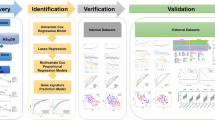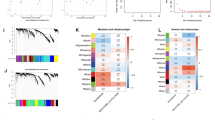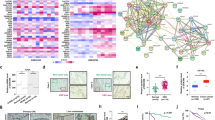Abstract
Production of lactate even in the presence of sufficient levels of oxygen (aerobic glycolysis) seems the prevalent energy metabolism pathway in cancer cells. The analysis of altered expression of effectors causing redirection of glucose metabolism would help to characterize this phenomenon with possible therapeutic implications. We analyzed mRNA expression of the key enzymes involved in aerobic glycolysis in normal mucosa (NM), primary tumor (PT) and liver metastasis (LM) of colorectal cancer (CRC) patients (pts) who underwent primary tumor surgery and liver metastasectomy. Tissues of 48 CRC pts were analyzed by RT-qPCR for mRNA expression of the following genes: hexokinase-1 (HK-1) and 2 (HK-2), embryonic pyruvate kinase (PKM-2), lactate dehydrogenase-A (LDH-A), glucose transporter-1 (GLUT-1), voltage-dependent anion-selective channel protein-1 (VDAC-1). Differences in the expression of the candidate genes between tissues and associations with clinical/pathologic features were studied. GLUT-1, LDH-A, HK-1, PKM-2 and VDAC-1 mRNA expression levels were significantly higher in PT/LM tissues compared with NM. There was a trend for higher expression of these genes in LM compared with PT tissues, but differences were statistically significant for LDH-A expression only. RAS mutation-positive disease was associated with high GLUT-1 mRNA expression levels only. Right-sided colon tumors showed significantly higher GLUT-1, PKM-2 and LDH-A mRNA expression levels. High glycolytic profile was significantly associated with poor prognosis in 20 metastatic, RAS-mutated pts treated with first-line chemotherapy plus Bevacizumab. Altered expression of effectors associated with upregulated glucose uptake and aerobic glycolysis occurs in CRC tissues. Additional analyses are warranted for addressing the role of these changes in anti-angiogenic resistance and for developing novel therapeutics.
This is a preview of subscription content, access via your institution
Access options
Subscribe to this journal
Receive 6 print issues and online access
$259.00 per year
only $43.17 per issue
Buy this article
- Purchase on Springer Link
- Instant access to full article PDF
Prices may be subject to local taxes which are calculated during checkout




Similar content being viewed by others
References
Cantor JR, Sabatini DM . Cancer cell metabolism: one hallmark, many faces. Cancer Discov 2012; 2: 881–898.
Ngo DC, Ververis K, Tortorella SM . Karagiannis TC. Introduction to the molecular basis of cancer metabolism and the Warburg effect. Mol Biol Rep 2015; 42: 819–823.
Augoff K, Hryniewicz-Jankowska A . Tabola R. Lactate dehydrogenase 5: an old friend and a new hope in the war on cancer. Cancer Lett 2015; 358: 1–7.
Talekar M, Boreddy SR, Singh A, Amiji M . Tumor aerobic glycolysis: new insights into therapeutic strategies with targeted delivery. Expert Opin Biol Ther 2014; 14: 1145–11459.
Szablewski L . Expression of glucose transporters in cancers. Biochim Biophys Act 2013; 1835: 164–169.
Krasnov GS, Dmitriev AA, Lakunina VA, Kirpiy AA, Kudryavtseva AV . Targeting VDAC-bound hexokinase II: a promising approach for concomitant anti-cancer therapy. Expert Opin Ther Targets 2013; 17: 1221–1233.
Tamada M, Suematsu M, Saya H . Pyruvate kinase M2: multiple faces for conferring benefits on cancer cells. Clin Cancer Res 2012; 18: 5554–5561.
Israël M, Schwartz L . The metabolic advantage of tumor cells. Mol Cancer 2011; 10: 70.
McIntyre A, Harris AL . Metabolic and hypoxic adaptation to anti-angiogenic therapy: a target for induced essentiality. EMBO Mol Med 2011; 7: 368–379.
Quintieri L, Selmy M, Indraccolo S . Metabolic effects of antiangiogenic drugs in tumors: therapeutic implications. Biochem Pharmacol 2014; 89: 162–170.
Elf SE, Chen J . Targeting glucose metabolism in patients with cancer. Cancer 2014; 120: 774–780.
Rubie C, Kempf K, Hans J, Su T, Tilton B, Georg T et al. Housekeeping gene variability in normal and cancerous colorectal, pancreatic, esophageal, gastric and hepatic tissues. Mol Cell Probes 2005; 19: 101–109.
Schmittgen TD, Livak KJ . Analyzing real-time PCR data by the comparative C(T) method. Nat Protoc 2008; 3: 1101–1108.
Livak KJ, Schmittgen TD . Analysis of relative gene expression data using real-time quantitative PCR and the 2(-Delta Delta C(T)) Method. Methods 2001; 25: 402–408.
Shi L, Jones WD, Jensen RV, Harris SC, Perkins RG, Goodsaid FM et al. The balance of reproducibility, sensitivity, and specificity of lists of differentially expressed genes in microarray studies. BMC Bioinformatics 2008; 9: S10.
Dupont WD . Statistical Modeling for Biomedical Researchers: A Simple Introduction to the Analysis of Complex Data. Cambridge University Press: Cambridge UK, 2002.
Hao K, Lamb J, Zhang C, Xie T, Wang K, Zhang B et al. Clinicopathologic and gene expression parameters predict liver cancer prognosis. BMC Cancer 2011; 11: 481.
Levine AJ, Puzio-Kuter AM . The control of the metabolic switch in cancers by oncogenes and tumor suppressor genes. Science 2010; 330: 1340–1344.
Han CB, Li F, Ma JT, Zou HW . Concordant KRAS mutations in primary and metastatic colorectal cancer tissue specimens: a meta-analysis and systematic review. Cancer Invest 2012; 30: 741–747.
Brannon AR, Vakiani E, Sylvester BE, Scott SN, McDermott G, Shah RH et al. Comparative sequencing analysis reveals high genomic concordance between matched primary and metastatic colorectal cancer lesions. Genome Biol 2014; 15: 454.
Ko JH, Gu W, Lim I, Zhou T, Bang H . Expression profiling of mitochondrial voltage-dependent anion channel-1 associated genes predicts recurrence-free survival in human carcinomas. PLoS One 2014; 9: e110094.
Papadaki C, Sfakianaki M, Lagoudaki E, Giagkas G, Ioannidis G, Trypaki M et al. PKM2 as a biomarker for chemosensitivity to front-line platinum-based chemotherapy in patients with metastatic non-small-cell lung cancer. Br J Cancer 2014; 111: 1757–1764.
Jin Z, Gu J, Xin X, Li Y, Wang H . Expression of hexokinase 2 in epithelial ovarian tumors and its clinical significance in serous ovarian cancer. Eur J Gynaecol Oncol 2014; 35: 519–524.
Herling A, König M, Bulik S, Holzhütter HG . Enzymatic features of the glucose metabolism in tumor cells. FEBS J 2011; 278: 2436–2459.
Heerdt BG, Houston MA, Augenlicht LH . Growth properties of colonic tumor cells are a function of the intrinsic mitochondrial membrane potential. Cancer Res 2006; 66: 1591–1596.
Petrelli F, Cabiddu M, Coinu A, Borgonovo K, Ghilardi M, Lonati V et al. Prognostic role of lactate dehydrogenase in solid tumors: a systematic review and meta-analysis of 76 studies. Acta Oncol 2015; 54: 961–970.
Petrelli F, Coinu A, Cabiddu M, Borgonovo K, Lonati V, Ghilardi M et al. Prognostic factors for survival with bevacizumab-based therapy in colorectal cancer patients: a systematic review and pooled analysis of 11,585 patients. Med Oncol 2015; 32: 456.
Koukourakis MI, Giatromanolaki A, Sivridis E, Gatter KC, Harris AL . Tumour Angiogenesis Research Group.. Lactate dehydrogenase 5 expression in operable colorectal cancer: strong association with survival and activated vascular endothelial growth factor pathway—a report of the Tumour Angiogenesis Research Group. J Clin Oncol 2006; 24: 4301–4308.
Loupakis F, Yang D, Yau L, Feng S, Cremolini C, Zhang W et al. Primary tumor location as a prognostic factor in metastatic colorectal cancer. J Natl Cancer Inst 2015; 107: pii dju427.
Schwanhäusser B, Busse D, Li N, Dittmar G, Schuchhardt J, Wolf J et al. Global quantification of mammalian gene expression control. Nature 2011; 473: 337–342.
Cho MH, Park CK, Park M, Kim WK, Cho A, Kim H . Clinicopathologic features and molecular characteristics of glucose metabolism contributing to 18F-fluorodeoxyglucose uptake in gastrointestinal stromal tumors. PLoS One 2015; 10: e0141413.
Ballman KV . Biomarker: predictive or prognostic? J Clin Oncol 2015; 33: 3968–3971.
Author information
Authors and Affiliations
Corresponding author
Ethics declarations
Competing interests
The authors declare no conflict of interest.
Rights and permissions
About this article
Cite this article
Graziano, F., Ruzzo, A., Giacomini, E. et al. Glycolysis gene expression analysis and selective metabolic advantage in the clinical progression of colorectal cancer. Pharmacogenomics J 17, 258–264 (2017). https://doi.org/10.1038/tpj.2016.13
Received:
Revised:
Accepted:
Published:
Issue Date:
DOI: https://doi.org/10.1038/tpj.2016.13
This article is cited by
-
Mitochondrial function and gastrointestinal diseases
Nature Reviews Gastroenterology & Hepatology (2024)
-
B7-H3 at the crossroads between tumor plasticity and colorectal cancer progression: a potential target for therapeutic intervention
Cancer and Metastasis Reviews (2024)
-
The effects of chemotherapy, primary tumor location and histological subtype on the survival of stage III colon cancer patients
BMC Gastroenterology (2023)
-
Regulating lactate-related immunometabolism and EMT reversal for colorectal cancer liver metastases using shikonin targeted delivery
Journal of Experimental & Clinical Cancer Research (2023)
-
Long-term 1,2-dimethylhydrazine triggers pathological remodeling of colon mucosa through repression of sestrin2, nuclear factor (erythroid-derived 2)-like 2, and sirtuin4 stimulating mitochondrial stress and metabolic reprogramming
Naunyn-Schmiedeberg's Archives of Pharmacology (2023)



